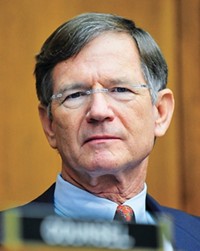Advertisement
Grab your lab coat. Let's get started
Welcome!
Welcome!
Create an account below to get 6 C&EN articles per month, receive newsletters and more - all free.
It seems this is your first time logging in online. Please enter the following information to continue.
As an ACS member you automatically get access to this site. All we need is few more details to create your reading experience.
Not you? Sign in with a different account.
Not you? Sign in with a different account.
ERROR 1
ERROR 1
ERROR 2
ERROR 2
ERROR 2
ERROR 2
ERROR 2
Password and Confirm password must match.
If you have an ACS member number, please enter it here so we can link this account to your membership. (optional)
ERROR 2
ACS values your privacy. By submitting your information, you are gaining access to C&EN and subscribing to our weekly newsletter. We use the information you provide to make your reading experience better, and we will never sell your data to third party members.
Policy
Abandon That Bill
by A. Maureen Rouhi
May 27, 2013
| A version of this story appeared in
Volume 91, Issue 21
To celebrate C&EN’s 90th anniversary, one Editor’s Page each month will examine materials from C&EN Archives. Featured articles are freely downloadable for one month.
It’s research-bashing time again. Congress has agreed to stop the National Science Foundation’s funding of research in political science, unless certified by the NSF director as promoting U.S. national security or economic interests. And Rep. Lamar S. Smith (R-Texas) has drafted the High Quality Research Act, which would “require the NSF director to affirm three new criteria for every research grant: that the project is in the interests of the U.S., that it addresses problems of the ‘utmost importance to society at large,’ and that it doesn’t duplicate other work at NSF or other federal agencies” (see page 38).
Smith is the chairman of the House of Representatives Science, Space & Technology Committee, an extremely influential position. The draft bill aims to “screen out ‘questionable grants,’ ” according to a ScienceInsider blog interview with a committee aide. Although attacks on NSF are not new, Smith’s latest move must not be dismissed as just another one.
Since its founding, NSF has been the subject of scrutiny by Congress, which dealt nearly fatal assaults on the agency’s funding in the early days. As C&EN reported on Jan. 19, 1953: “In August 1951 the House cut the request for fiscal 1952 exactly 98%—from $14 million to $300,000—and much effort was necessary to get the budget restored to a most inadequate $3.5 million.”
Smith is just the latest vociferous critic of NSF, which funds almost 20% of all federally supported research in academia. His request to obtain reviews of five NSF-funded social science projects, which the agency has rightfully refused, suggests a dislike of certain types of research that brings to mind William Proxmire.
A Democrat from Wisconsin who served in the U.S. Senate from 1957 to 1989, Proxmire crusaded against wasteful government spending, famously issuing to offenders the Golden Fleece Award. The first award went to NSF in 1975 for funding an $84,000 study on why people fall in love. In a story on March 10, 1975, C&EN noted Proxmire’s annoyance with “projects with such titles as Hitchhiking—A Viable Addition to a Multimodal Transportation System.”
The crusade backfired when one Golden Fleece victim fought back. Proxmire conferred the notorious honor to NSF, NASA, and the Office of Naval Research “for spending about $500,000 to support research by Ronald R. Hutchinson, then director of research at Kalamazoo, Mich., State Mental Hospital, on human and animal aggression,” C&EN reported on March 31, 1980. The senator could not have foreseen that Hutchinson would file an $8 million libel suit against him. Although two lower courts dismissed the suit, the Supreme Court rejected their findings, clearing the way for a trial. Proxmire recanted his statements about Hutchinson’s research and agreed to pay $10,000 to settle the case.
Wasteful spending is unacceptable, and the requirement against duplication in Smith’s draft bill, if properly defined, may help address that problem. But the other stipulations—meeting vaguely defined U.S. interests and “importance”—are misguided and dangerous. They would wipe out federal funding for basic research, on which we rely for the inventions and innovations that give us prosperity, national security, and other facets of modern life that we take for granted. Smith’s draft bill must not advance.
In a letter on May 8, previous heads of NSF and its governing body, the National Science Board, including Stanford University chemistry professor Richard N. Zare, asked the House science committee to “forego any further action” on the draft bill. “The history of science and technology has shown that truly basic research often yields breakthroughs—including new technologies, markets, and jobs—but that it is impossible to predict which projects (and which fields) will do that,” they wrote.
For his strong support of science and technology innovation, Smith received the American Chemical Society’s 2013 Public Service Award last month. But his draft bill will undermine NSF’s vital role in U.S. innovation, economic growth, and job creation. Let’s hope he recognizes the contradiction.
Views expressed on this page are those of the author and not necessarily those of ACS.



Join the conversation
Contact the reporter
Submit a Letter to the Editor for publication
Engage with us on Twitter